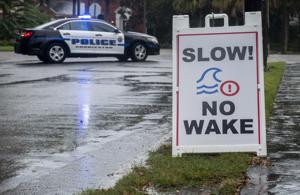
CHARLESTON — We’ve all had some wild questions run through our minds when sitting at home, staring out the window as torrential rain showers flood our lawns and roadways.
With hurricane season fast approaching and a few recent instances of seemingly monsoon-level rainfall, have you ever wondered about any of the following questions?
We asked some experts on the validity of these storm-related claims as they apply to Charlestonians.
You could be electrocuted while showering during a thunderstorm.
TRUE. Perhaps you’ve heard the old wives’ tale that you shouldn’t bathe during a thunderstorm. Turns out, there’s some validity to that statement.
When lightning strikes, it targets objects that will transfer electricity. When lightning strikes homes, it can target a few conduits, frequently internal wiring or plumbing.
Lightning can race through plumbing and jump from metal shower heads or tub taps, striking someone using the appliance, said Dr. Steven Khan, chief of burn surgery at the Medical University of South Carolina. The burn wing opened in 2020, becoming the first dedicated inpatient unit in the state. Since then, Dr. Khan said he’d seen several lightning strike cases a year.
Lightning is an arc flash that jumps from clouds to the ground or other conduits, resulting in a wide range of potential injuries. “The injuries you see are anywhere from nothing — no injuries — to minor burns, to major burns and other serious complications, or to instant death,” Dr. Khan said.
Due to the high-voltage electrical current, upwards of 300 million volts, lightning strikes can contract muscles, fracturing bones throughout the body or completely fry the nervous system, according to Dr. Khan.
Thus, it’s “best to avoid all water during a thunderstorm,” according to the Centers for Disease Control. This includes showering, bathing, washing dishes, washing your hands and any other activity involving running water.
(Except for the headline, this story has not been edited by PostX News and is published from a syndicated feed.)

